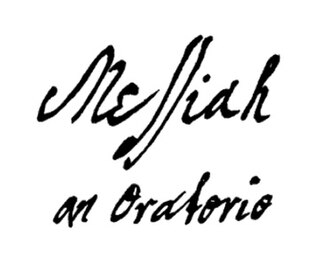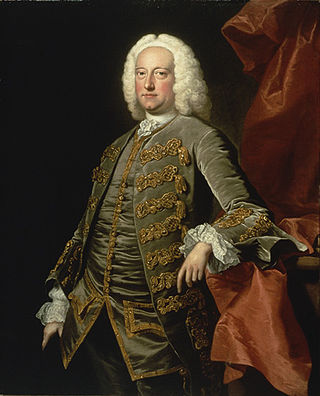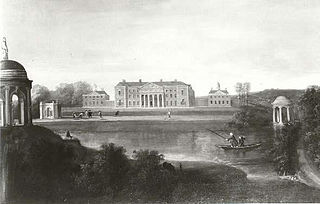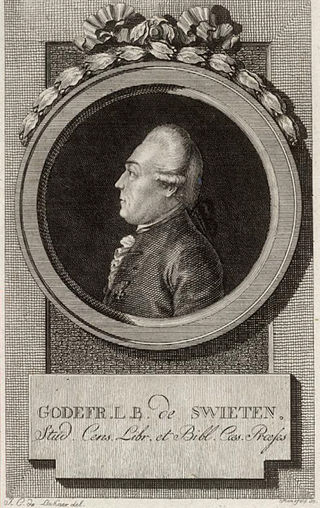
George FridericHandel was a German-British Baroque composer well known for his operas, oratorios, anthems, concerti grossi, and organ concertos. Handel received his training in Halle and worked as a composer in Hamburg and Italy before settling in London in 1712, where he spent the bulk of his career and became a naturalised British subject in 1727. He was strongly influenced both by the middle-German polyphonic choral tradition and by composers of the Italian Baroque. In turn, Handel's music forms one of the peaks of the "high baroque" style, bringing Italian opera to its highest development, creating the genres of English oratorio and organ concerto, and introducing a new style into English church music. He is consistently recognized as one of the greatest composers of his age.

Messiah is an English-language oratorio composed in 1741 by George Frideric Handel. The text was compiled from the King James Bible and the Coverdale Psalter by Charles Jennens. It was first performed in Dublin on 13 April 1742 and received its London premiere nearly a year later. After an initially modest public reception, the oratorio gained in popularity, eventually becoming one of the best-known and most frequently performed choral works in Western music.

Jane Siberry is a Canadian singer-songwriter, known for such hits as "Mimi on the Beach", "I Muse Aloud", "One More Colour" and "Calling All Angels". She performed the theme song to the television series Maniac Mansion. She has released material under the name Issa – an identity which she used formally between 2006 and 2009.
The year 1718 in music involved some significant events.
The year 1712 in music involved some significant events.

Handel & Hendrix in London is a museum in Mayfair, London, dedicated to the lives and works of the German-born British baroque composer George Frideric Handel and the American rock singer-guitarist Jimi Hendrix, who lived at 25 and 23 Brook Street respectively.

Israel in Egypt, HWV 54, is a biblical oratorio by the composer George Frideric Handel. Most scholars believe the libretto was prepared by Charles Jennens, who also compiled the biblical texts for Handel's Messiah. It is composed entirely of selected passages from the Old Testament, mainly from Exodus and the Psalms.

Charles Jennens was an English landowner and patron of the arts. As a friend of Handel, he helped author the libretti of several of his oratorios, most notably Messiah.

L'Allegro, il Penseroso ed il Moderato(The Cheerful Man, the Thoughtful Man and the Moderate Man), HWV 55, is a pastoral ode by George Frideric Handel based on the poetry of John Milton.

An Occasional Oratorio is an oratorio by George Frideric Handel, based upon a libretto by Newburgh Hamilton after the poetry of John Milton and Edmund Spenser. The work was written in the midst of the Jacobite rising of 1745–1746, the attempt to overthrow Handel's patrons the Hanoverian monarchy under George II and replace them with a Stuart restoration under Charles Edward Stuart, "Bonnie Prince Charlie". The Occasional Oratorio is unique among Handel's works which he labelled "oratorio" in that it does not tell a story or contain elements of a drama, but was intended as a defiant and patriotic rallying piece.

Gopsall is a former civil parish, now in the parish of Twycross, in the Hinckley and Bosworth district, in the county of Leicestershire, England. It is located between the villages of Appleby Magna, Shackerstone, Twycross and Snarestone. In 1931 the parish had a population of 13. Gopsall was formerly an extra-parochial tract, from 1858 Gopsall was a civil parish in its own right, on 1 April 1935 the parish was abolished and merged with Twycross.
Few of the letters and writings of George Frideric Handel remain today—certainly far fewer than remain for other major composers. Handel wrote relatively few letters and kept no diary, yet those letters that do remain provide insight into the various aspects of Handel's life. One reason for the small number of surviving letters is that Handel did not hold any office that would require the collecting and saving of his records and writings.

John Mainwaring was an English theologian and the first biographer of the composer Georg Friedrich Händel in any language. He was a Fellow of St. John's College, Cambridge, and parish priest, and later a professor of Divinity at Cambridge.

Messiah, the English-language oratorio composed by George Frideric Handel in 1741, is structured in three parts, listed here in tables for their musical setting and biblical sources.

Messiah, the English-language oratorio composed by George Frideric Handel in 1741, is structured in three parts. The wordbook was supplied by Charles Jennens. This article covers Part I and describes the relation of the musical setting to the text. Part I begins with the prophecy of the Messiah and his virgin birth by several prophets, namely Isaiah. His birth is still rendered in words by Isaiah, followed by the annunciation to the shepherds as the only scene from a Gospel in the oratorio, and reflections on the Messiah's deeds. Part II covers the Passion, death, resurrection, ascension, and the later spreading of the Gospel. Part III concentrates on Paul's teaching of the resurrection of the dead and Christ's glorification in heaven.

Der Messias, K. 572, is Wolfgang Amadeus Mozart's 1789 German-language version of Messiah, George Frideric Handel's 1741 oratorio. On the initiative of Gottfried van Swieten, Mozart adapted Handel's work for performances in Vienna.










